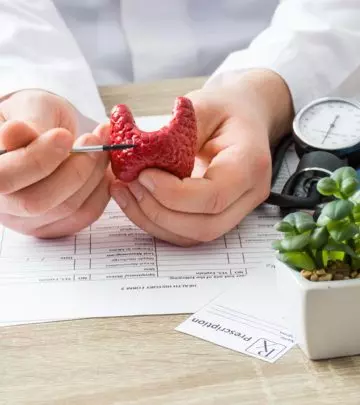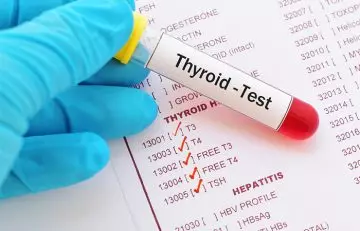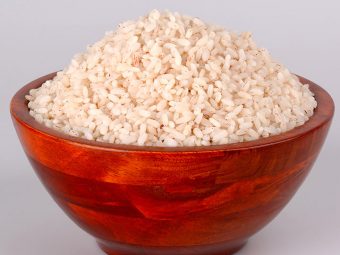5 Things Women With PCOS Should Know About Hypothyroidism

Image: Shutterstock
Not that any health problem is ever welcome, but the ones that are hard to detect and cure are the ones we dread the most. Hypothyroidism and Polycystic ovary syndrome (PCOS) are probably the two most overlooked hormonal disorders that lead to complicated situations. Even though PCOS and hypothyroidism are different from each other, they have a lot of common symptoms. Here are five things women suffering from PCOS should know about hypothyroidism, which will help them with early diagnosis and treatment. Go on to read them all.
1. How Does Hypothyroidism Affect Women Who Have PCOS
Hypothyroidism, in particular Hashimoto’s thyroiditis, is common in women who have PCOS (1). It is an autoimmune problem where the body attacks the thyroid gland, leading to hypothyroidism. A study conducted in 2013 found that 22.2% of women diagnosed with PCOS had hypothyroidism compared to the 8.75% who were without PCOS. Another test in 2015 found that 22.1% of women who had PCOS were also fighting Hashimoto’s thyroiditis (2).
2. How Does Hypothyroidism Worsen The Symptoms Of PCOS
Hypothyroidism also affects ovaries in a way PCOS does. It causes enlargement of the ovaries and leads to the formation of cysts. It also produces more testosterone, which can give you a receding hairline, acne, and hirsutism (3). This also makes you have irregular periods and interferes with the formation of follicles in the ovaries. In a way, it worsens the symptoms and increases the risk of insulin resistance, which leads to type 2 diabetes.
3. How Does Hypothyroidism Complicate PCOS
The thyroid is a butterfly-shaped gland situated at the base of your throat. It regulates your metabolism, controls your heart rate, and influences the menstrual cycle and fertility. If the production of the hormone slows down, it will lead to slower metabolism, and this is when you start to gain weight. There are also complications like bradycardia, facial swelling, and goiter if the problem is not solved at an early stage (4). Unprecedented weight gain is what centers both these health ailments.
4. How Does Hypothyroidism Get Ignored
Thyroid-stimulating hormone is produced by the pituitary gland. This is what regulates the production of the hormones T3 and T4 (5). The high TSH levels suggest that you may have hypothyroid. This mostly happens because the pituitary is working overtime to stimulate the underactive thyroid gland. However, the high levels of TSH do not always have to result in hypothyroidism. Because both these ailments have similar symptoms, hypothyroidism often gets misdiagnosed as PCOS. The diagnosis requires a series of tests to check if you have an autoimmune disease.
5. Role Of Iodine
Thyroid glands need iodine to make the hormone. The primary sources of iodine are dairy products, iodized salt, chicken, fish, pork, and beef (6). The right amount of iodine is essential to keep up the balance.
Now that you know what causes hypothyroidism, and when to get checked, here are some remedies to keep your thyroid in check.
1. Ditch Gluten
A good diet can help you manage your hormone regulation like no other. People who suffer from PCOS and hypothyroidism are aided with special diets to keep the trigger to a minimum. Gluten is processed with bromide, which displaces iodine and causes an imbalance in hormones. Gluten sensitivity may damage your gut lining and interfere with hormones that cause inflammation.
2. Reduce Sugar Intake
Sugar is bad for you even if you don’t have hypothyroidism or PCOS, but it causes further harm if you have a thyroid imbalance. While your thyroid gland is already struggling to balance blood sugar, taking additional sugar will lead to weight gain and fatigue.
3. Eat Iodine Rich Food
The right balance of iodine is a must for proper thyroid production. You can take supplements, but the best way to add iodine is through natural sources like dairy and meat.
4. Take Probiotics
The gut bacteria play a central role in regulating your thyroid hormones. The gut is a reservoir of thyroid hormones and converts T3 into T4. A quality probiotic can balance your gut bacteria and support the conversion of hormones.
5. Manage Stress
Stress is a trigger for thyroid dysfunction. It can also cause flare-ups in symptoms if already diagnosed with hypothyroidism. Simple activities like reading a book, taking a walk, epsom salt bath, and aromatherapy can work wonders to lower your stress.
6. Try Acupuncture
Acupuncture is a great way to balance your hormone production. It is also an excellent way to relax and relieve your muscles. Researchers found that people with thyroid problems saw significant improvements after going for acupuncture regularly.
The biggest problem with hypothyroidism is not being diagnosed at the right time. The symptoms like lethargy and weight gain are often ignored and thought normal. It is essential to spread awareness and make sure everyone gets their needed treatment at the right time.



































